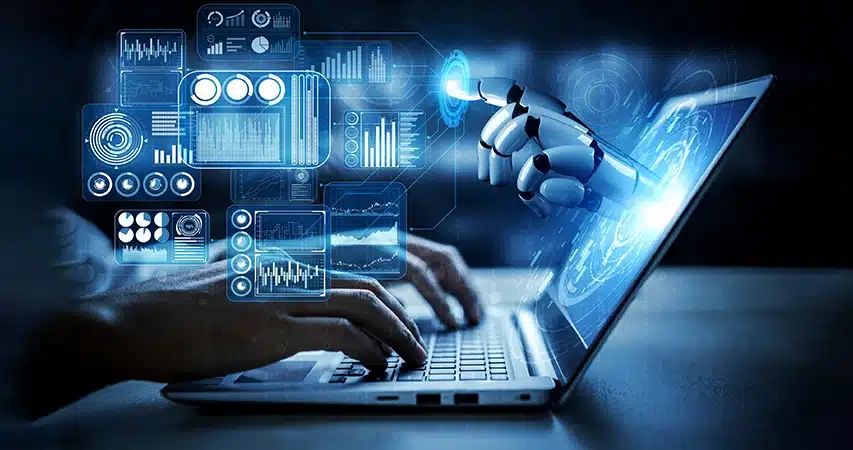There has been an influx of AI-based tools for the common masses recently. As advanced AI-based chatbots such as ChatGPT, Bing AI, Bard and other technologies continue to advance, there are several new job opportunities and career paths for programmers and developers.
Additionally, the advancement of AI-based tools also results in the rise of various moral and ethical doubts in various domains. For example, we are yet to fully formulate the laws and policies regarding the usage of AI-based ATS, which is responsible for screening numerous candidates during interviews.
Hence, with the advancement of AI and related technologies, we can assure you that there will be a rise in demand for new-age jobs related to managing the data used by these technologies. Let us check out some of these new opportunities presented by the introduction of AI in HR sphere.
1. AI Ethicist
As AI technology continues to transform various industries, the importance of AI ethics will become more pronounced. One of the areas where the role of AI ethics is crucial is human resources (HR). An AI ethicist in HR will be a professional responsible for designing, implementing, and monitoring ethical AI systems within an organization’s HR department.
The AI ethicist in HR will play a vital role in ensuring that AI systems used in recruitment, performance management, and employee engagement are fair and unbiased. They will be responsible for evaluating the ethical implications of the AI algorithms used in HR processes and ensuring that they comply with legal and ethical standards.
AI ethicists in HR will also work with other HR professionals to identify potential areas of bias in the AI systems used in the HR department. They will analyse the database and identify patterns that could lead to discrimination against certain groups of employees or job applicants, and help avoid such a scenario.
Moreover, AI ethicists in HR will be ensuring that employees and job applicants are aware of the AI systems used in HR processes, their purpose, and the data used to train them. It helps build trust among employees and job applicants and ensures that the AI systems are used fairly and transparently.
2. Chatbot Designer
Chatbot designers in HR will be responsible for creating and maintaining chatbots that interact with job applicants, employees, and other HR stakeholders. These chatbots will provide personalized and efficient communication with employees and job applicants.
The chatbots will perform various tasks, such as answering common HR questions, providing information on job openings, and scheduling interviews, as they would be specifically designed to undertake such HR tasks. The chatbot designers will also ensure that chatbots are user-friendly and accessible, especially for job applicants who may have limited technical expertise.
Furthermore, chatbot designers in HR will continuously monitor and analyse the chatbot interactions to identify areas for improvement. They will be able to work with other HR professionals to identify potential problems that chatbots may not be able to solve, such as complex HR issues that require human interaction.
The role of HR chatbot designers is crucial in developing and maintaining effective chatbots that can enhance communication between HR departments, employees, and job applicants. As the use of chatbot technology in HR continues to grow, chatbot designers in HR will become increasingly important in improving HR processes and enhancing the overall employee experience.
3. Data Analyst
As companies increasingly use artificial intelligence (AI) technology in their HR processes, the need for AI data analysts in HR is becoming more prevalent. AI data analysts in HR will be responsible for working with large amounts of data generated by AI systems, providing insights that can improve HR processes, such as recruitment, performance management, and employee engagement.
AI data analysts use advanced analytical tools to examine data and identify trends, patterns, and insights that can help HR departments make data-driven decisions. They will be analysing employee data, such as performance evaluations, engagement surveys, and retention rates, to identify areas for improvement and develop strategies to address them.
Moreover, AI data analysts will work with other HR professionals to develop predictive models that can forecast employee behaviour, such as employee turnover and engagement. These models can help HR departments to identify potential issues before they become problematic and develop targeted strategies to address them.
4. HR Automation Specialist
HR AI automation specialists are professionals responsible for designing, implementing, and managing AI systems that automate and streamline HR processes. These professionals create systems that can streamline HR operations, reduce manual labour, and improve efficiency.
HR AI automation specialists will also be working with other HR professionals to identify areas where automation can be implemented effectively. They will be required to analyse HR processes, such as recruitment, onboarding, and payroll, and identify tasks that can be automated. They will then design AI systems that can perform these tasks efficiently and accurately.
Moreover, HR AI automation specialists will ensure that the AI systems are integrated seamlessly with existing HR system, such as HR information systems (HRIS) and applicant tracking systems (ATS). They will be working with other IT professionals to develop and implement these systems, ensuring that they are secure and comply with legal and ethical standards.
5. AI Recruiter
An AI Recruiter is a recruiter who uses artificial intelligence algorithms to automate and optimize the recruitment process. AI recruiters can streamline the hiring process, improve candidate sourcing, and enhance the overall candidate experience.
AI recruiters can perform a wide range of tasks, such as screening resumes, scheduling interviews, and even conducting initial interviews using chatbots or virtual assistants. With the help of natural language processing and machine learning algorithms, AI recruiters can analyse candidate profiles, identify potential red flags, and assess a candidate’s fit for a specific designation.
One of the most significant benefits of an AI recruiter is their ability to eliminate bias from the recruitment process since AI undertakes the screening. Unlike human recruiters, AI algorithms do not have personal biases or preferences that could influence their decision-making process. Hence, it can result in a more diverse and inclusive pool of candidates.
6. Learning and Development Specialist
The learning and development specialist will be a role that focuses on designing, developing, and implementing training programs that teach employees how to work effectively with AI technologies.
This AI specialist will be responsible for creating educational materials that help employees understand how AI is changing their roles and responsibilities, as well as providing hands-on training on how to use AI tools and technologies. They may also be involved in developing policies and procedures that govern the ethical use of AI in the workplace.
In addition to technical expertise, HR Learning and Development Specialists in AI must possess strong communication and interpersonal skills, as they will be working closely with both technical and non-technical employees across the organization. They must also have a deep understanding of the business and how AI can be leveraged to achieve strategic objectives.
7. Talent Management Consultant
As the use of artificial intelligence (AI) continues to grow in the workplace, businesses will be seeking out AI Talent Management Consultants to help them attract, develop, and retain talent with the skills necessary to thrive in an AI-driven environment.
These consultants will be specialists in identifying and assessing the skills and competencies needed to work with AI technologies, as well as creating strategies for attracting and developing top talent in this field. They will work with organizations to develop training and development programs that enhance employees’ skills and prepare them for the challenges of working with AI.
The AI talent management consultants will also play an essential role in helping organizations identify and recruit top talent in the field of AI. They will be using their expertise to help businesses identify the best channels for sourcing talent, as well as developing job descriptions and candidate profiles that accurately reflect the skills and competencies required for success in an AI-driven environment.
Also Read:
Conclusion
In conclusion, it needs to be said that the rapid evolution of artificial intelligence technology is transforming the field of HR. As a result, new AI-based career opportunities are emerging in this sphere, creating exciting new prospects for HR professionals.
From AI recruiters to HR learning and development specialists in AI, AI talent management consultants, and more, there is a wide range of roles that require technical expertise and a deep understanding of the intersection between technology and HR.
These new career opportunities offer HR professionals the chance to take on challenging and rewarding roles that are critical to the success of their organizations. By embracing these opportunities, HR personnel can stay ahead of the curve in the rapidly changing world of work and contribute to the ongoing evolution of HR practices.
Ultimately, the rise of AI in HR represents a significant opportunity for HR professionals to drive innovation, improve efficiency, and enhance the employee experience, while also advancing their careers.








